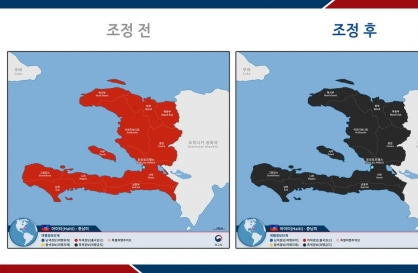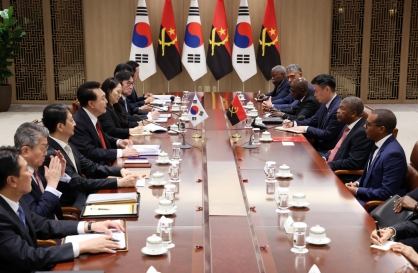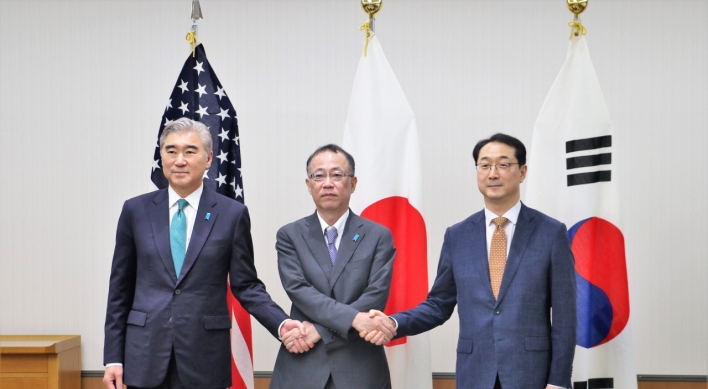The life of an honorary consul
Cho Hae-hyeong, honorary consul to Iceland and dean of the corps of honorary consuls in Korea, explains what it takes to represent a foreign country here
By Korea HeraldPublished : Jan. 20, 2013 - 20:20
Iceland does not have an embassy in Korea, but it does have a diplomatic representative.
Cho Hae-hyeong, chairman and CEO of Nara Holdings and former CEO of Ssangyong Corp., has been an important catalyst in the diplomatic relations between Korea and Iceland for years ― 25 years to be exact ― as the honorary consul-general of Iceland.
Iceland does not pay him for the work he does. Cho was not born in Iceland and is not even a citizen of Iceland ― he is Korean.
Cho Hae-hyeong, chairman and CEO of Nara Holdings and former CEO of Ssangyong Corp., has been an important catalyst in the diplomatic relations between Korea and Iceland for years ― 25 years to be exact ― as the honorary consul-general of Iceland.
Iceland does not pay him for the work he does. Cho was not born in Iceland and is not even a citizen of Iceland ― he is Korean.

As honorary consul general, Cho provides consular and other minor diplomatic services. He helps make sure government officials from Iceland meet the right people when they come to Seoul and facilitates tourism, cultural and sports exchanges, as well as business delegations from Iceland.
“Most of all, to be a good honorary consul, you should be good citizen of Korea, though you do not have to be a Korean citizen,” Cho said about what it takes to be an honorary consul in Korea during an interview with The Korea Herald at the Seoul Club, a popular locale for many in Korea’s foreign business and diplomatic community.
“You should have an interest in the bilateral relations of Korea and the country you represent, but you must be honest and honorable, and be a well-respected person of the community,” he said.
The role Cho has played in improving relations between Iceland and Korea contrasts starkly with the tabloid exploits of Tampa Bay, Florida, socialite Jill Kelley who was appointed as honorary consul by Korea in 2011 and inadvertently took down four-star General David Petraeus, forcing him to resign as CIA director.
Kelley erroneously claimed her personalized license plate, “Honorary Consul 1JK,” gave her special privileges. She falsely told a police dispatcher she had “diplomatic inviolability,” complaining about reporters trespassing on her front lawn.
She even tried to exploit her position by offering to act as go-between for a deal with CEO of TransGas Development Systems and Korea on a coal-gasification project. Her price: $80 million.
“She was more of a lobbyist than a honorary consul,” Cho said. Kelley was dismissed by Korea as its honorary consul when news spread of how she misused her position.
The honorary consul position does not get much better treatment in popular literature, either.
Charles Fortnum, the eponymous figure in Graham Greene’s 1973 novel, “The Honorary Consul,” is a divorced, self-pitying alcoholic who misuses his position.
But the lives of most honorary consuls are nothing like the ribald Kelley and the morally destitute Fortnum.
It is a part-time position with no special privileges or protections. Honorary consuls are meant to simply help nudge relations forward, or help an expatriate with a phone call or a visa when no official diplomat is there to do it.
One cultural event that Cho recalled helping Iceland take part in took place shortly after he became Iceland’s honorary consul, the 29th Miss Universe Beauty Pageant at Sejong Cultural Center in 1980.
Iceland needed help to facilitate Miss Iceland Guo Bjorg Sigurdardottir’s participation in the Miss Universe beauty pageant. Cho arranged promotional events, meetings and basically made Iceland’s involvement in Miss Universe in Korea a good experience.
Ultimately, Sigurdardottir did not win; Miss USA Shawn Weatherly did. But she finished in the top six and that success was in no small part due to the role of Cho.
Even though Iceland has no diplomatic mission in Korea, the country had diplomatic support from Cho providing consular and other services.
Most of the 118 nations with honorary consuls in Korea do not have a diplomatic mission in the country. Some with an embassy here have more than one honorary consul. On the other end of the spectrum, those with the largest embassies here, such as the United States, Japan and China, have none.
The Commonwealth of Dominica appointed the most recent honorary consul in Korea, Charles Hwang, a local entrepreneur.
The vast majority of honorary consuls in Korea have a business background.
“We do work to promote culture, tourism, sports and art, among other things, but business cooperation is the primary role of an honorary consul,” Cho said.
The bilateral relationship between Iceland and Korea primarily takes the shape of culture and tourism, as well as fisheries and other maritime issues.
Geothermal energy is the big new area for cooperation between Korea and Iceland, and Cho said there is also a possibility of Korea joining a consortium that will involve Iceland on energy exploration in the arctic seabed for oil and natural gas drilling.
Cho’s long tenure as Iceland’s honorary consul general means he is also the dean of the corps of 132 honorary consuls in Korea. He is also chairman of the Korean-German Chamber of Commerce and Industry.
Honorary consuls here meet once a month for informal gatherings, usually with an official from the Ministry of Foreign Affairs and Trade. Foreign Minister Kim Sung-hwan will organize a dinner reception for them this Wednesday.
By Philip Iglauer (ephilip2011@heraldcorp.com)
-
Articles by Korea Herald



















